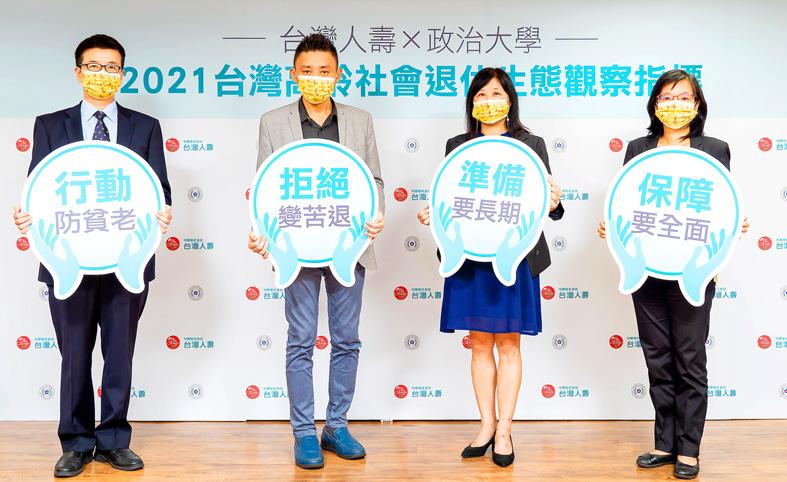More than half of Taiwanese intend to continue working after retirement, while 72 percent would keep wealth management services after retirement to bolster their financial security, a survey released yesterday by Taiwan Life Insurance Co (台灣人壽) showed.
“Retirement has traditionally been viewed as the start of a second life, during which people have the financial stability to allow for a leisurely lifestyle, but this survey indicated that many people do not think that will happen,” National Chengchi University banking professor Sharon Yang (楊曉文) said.
According to the poll, 50.4 percent of respondents said they would not have enough pension when they retire, and 74 percent said they expect the government to reduce pensions.

Photo courtesy of Taiwan Life Insurance Co
Ninety-five percent said they were worried about coverage under the nation’s public health system, while more than 60 percent said they were concerned about coverage under the long-term care system, the survey showed.
While 74 percent of respondents said they had purchased medical insurance policies, long-term care insurance was much less popular, with only 35 percent saying they had bought such policies, the survey showed.
NOT REALISTIC
More than 50 percent said they hoped to live at retirement facilities with monthly expenses of less than NT$30,000, but Taiwan Life said that was not practical, adding that most respondents were not aware of how much money they need for retirement.
On average, respondents in this year’s survey said they plan to allocate NT$8,216 per month to prepare for retirement, down from NT$15,086 last year, while they plan to save NT$6,528 yearly for long-term care plans, which was also down from NT$9,905 last year, the insurer said.
“It might be the COVID-19 outbreak that reduced people’s preparation for retirement or long-term care, as people need to spend money fighting the pandemic,” Yang said.
Nearly 40 percent of those who have not retired said they have not finalized their retirement plans yet, but for those who had, they plan to rely on fixed deposits for their retirement, Taiwan Life said.
The poll, which was conducted in May, collected 1,202 valid responses.

When an apartment comes up for rent in Germany’s big cities, hundreds of prospective tenants often queue down the street to view it, but the acute shortage of affordable housing is getting scant attention ahead of today’s snap general election. “Housing is one of the main problems for people, but nobody talks about it, nobody takes it seriously,” said Andreas Ibel, president of Build Europe, an association representing housing developers. Migration and the sluggish economy top the list of voters’ concerns, but analysts say housing policy fails to break through as returns on investment take time to register, making the

‘SILVER LINING’: Although the news caused TSMC to fall on the local market, an analyst said that as tariffs are not set to go into effect until April, there is still time for negotiations US President Donald Trump on Tuesday said that he would likely impose tariffs on semiconductor, automobile and pharmaceutical imports of about 25 percent, with an announcement coming as soon as April 2 in a move that would represent a dramatic widening of the US leader’s trade war. “I probably will tell you that on April 2, but it’ll be in the neighborhood of 25 percent,” Trump told reporters at his Mar-a-Lago club when asked about his plan for auto tariffs. Asked about similar levies on pharmaceutical drugs and semiconductors, the president said that “it’ll be 25 percent and higher, and it’ll

CHIP BOOM: Revenue for the semiconductor industry is set to reach US$1 trillion by 2032, opening up opportunities for the chip pacakging and testing company, it said ASE Technology Holding Co (日月光投控), the world’s largest provider of outsourced semiconductor assembly and test (OSAT) services, yesterday launched a new advanced manufacturing facility in Penang, Malaysia, aiming to meet growing demand for emerging technologies such as generative artificial intelligence (AI) applications. The US$300 million facility is a critical step in expanding ASE’s global footprint, offering an alternative for customers from the US, Europe, Japan, South Korea and China to assemble and test chips outside of Taiwan amid efforts to diversify supply chains. The plant, the company’s fifth in Malaysia, is part of a strategic expansion plan that would more than triple

Taiwanese artificial intelligence (AI) server makers are expected to make major investments in Texas in May after US President Donald Trump’s first 100 days in office and amid his rising tariff threats, Taiwan Electrical and Electronic Manufacturers’ Association (TEEMA, 台灣電子電機公會) chairman Richard Lee (李詩欽) said yesterday. The association led a delegation of seven AI server manufacturers to Washington, as well as the US states of California, Texas and New Mexico, to discuss land and tax issues, as Taiwanese firms speed up their production plans in the US with many of them seeing Texas as their top option for investment, Lee said. The